When it comes to improving overall health and well-being, the connection between physical fitness and mental clarity cannot be overstated. In today’s fast-paced world, where stress and anxiety are prevalent, maintaining a fitness routine can have profound effects on both the body and mind. Let’s delve into the science behind how exercise can not only improve physical health, but also enhance mental clarity and cognitive function.
The Physical Benefits of Exercise
Regular exercise is essential for maintaining a healthy body. It can help reduce the risk of chronic diseases such as heart disease, diabetes, and obesity. Exercise also plays a crucial role in improving cardiovascular health, increasing muscle strength, and boosting overall endurance. When we engage in physical activity, our bodies release endorphins, often referred to as the “feel-good” hormones, which can improve mood and reduce feelings of stress and anxiety.
The Relationship Between Fitness and Mental Clarity
But the benefits of exercise go beyond physical health. Studies have shown that regular exercise can also have a profound impact on cognitive function and mental clarity. When we exercise, blood flow to the brain increases, delivering much-needed oxygen and nutrients to brain cells. This can enhance memory, focus, and overall cognitive function.
The Role of Neurotransmitters
Exercise also affects the release of neurotransmitters in the brain. For example, the production of dopamine, a neurotransmitter associated with pleasure and reward, increases during physical activity. This can lead to enhanced mood and a greater sense of well-being. Additionally, exercise can also stimulate the production of serotonin, a neurotransmitter that helps regulate mood and promote feelings of calm and happiness.
The Importance of Routine
Consistency is key when it comes to reaping the benefits of exercise for mental clarity. Establishing a regular fitness routine can help improve mood, reduce stress, and enhance cognitive function over time. Whether it’s going for a run, lifting weights, or practicing yoga, finding an exercise regimen that works for you is essential for maintaining both physical and mental well-being.
Incorporating Mindfulness
In addition to physical exercise, incorporating mindfulness practices such as meditation and deep breathing can further enhance mental clarity and overall well-being. Mindfulness can help reduce feelings of stress and anxiety, improve focus and concentration, and promote a greater sense of self-awareness. By combining physical fitness with mindfulness practices, you can create a holistic approach to improving both your body and mind.
Conclusion
The science behind the connection between fitness and mental clarity is clear: regular exercise can have profound effects on both physical health and cognitive function. By establishing a consistent fitness routine and incorporating mindfulness practices, you can enhance your overall well-being and improve both your body and mind. So next time you lace up your sneakers or roll out your yoga mat, remember that you’re not just doing it for your physical health – you’re also investing in your mental clarity and cognitive function.
